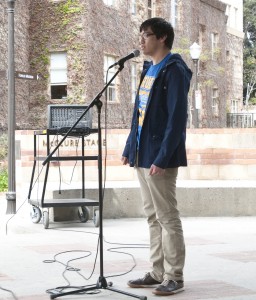The original version of this article contained information that was unclear and has been changed. See the bottom of the article for additional information.
In our nation’s discourse on the issue of immigration and individuals living in the country illegally, we seem to forget the idea of the American “melting pot” that we learned so often in elementary school.
Current conversations surrounding illegal immigration too often revolve solely around misguided schemes to “secure” the U.S.-Mexico border and controversial immigration laws.
This narrow frame of discussion is often inaccurate and dismisses the diversity and complexity of the politics of immigration. To treat illegal immigration as a Latino-specific issue is to understate the challenges faced by the many other immigrants of different origins that live in the country illegally.
Although about half of the people living in the United States illegally are of Latino descent, about 10 percent of this group are of Asian and Pacific Islander descent. Approximately 416,000 Asian and Pacific Islander immigrants residing in the country illegally live in California, the Los Angeles Times reported.
In the 2010-11 academic year, 306 “potentially undocumented” Asian students qualified for in-state tuition under California AB 540, legislation passed in 2001 that exempts non-resident students who have met certain requirements such as attending a California high school for three academic years from paying the out-of-state fees, according to a report released by the University of California Office of the President.

Like any population of people residing in the country illegally, Asian and Pacific Islanders face their own, singular set of challenges.
One of the most widely discussed issues involving Asian and Pacific Islander immigrants is the myth of the model minority, a stereotype which contends that Asian and Pacific Islanders are high-achieving because their culture places a higher value on a strict work ethic than other minority groups.
“If you are an Asian-American and you do just as well as average Americans, society wouldn’t really acknowledge you as being average,” said Min Zhou, professor of sociology and founding chair of the Asian-American Studies Department at UCLA, “Society holds you to a higher standard, for example, society expects Asian-Americans to attend college where as it expects less from other minority groups.”
This myth, which first emerged in the 1960s, does not take into account that many Asian-American immigrants coming to the United States already hold college degrees, Zhou said.
Their children are more likely to be well-off, not because of any particular cultural value placed on working hard, but rather because they have access to resources and opportunities out of reach of other minority groups because of their family background, Zhou added.
Of course, this stereotype must compete with a multitude of similarly baseless conceptions about individuals residing in the country illegally.
“The media in our political system has done a phenomenal job at criminalizing (the undocumented) population, as lawbreakers and job takers,” said Angela Chen, undocumented student programs coordinator at the Bruin Resource Center. “In reality (the undocumented community) actually contributes millions of dollars to the GDP from taxes, and they do not benefit from government resources.”
These conflicting social pressures contribute to the invisibility of Asian and Pacific Islander students living here illegally because, on one hand, society holds Asian and Pacific Islanders to a higher standard but, on the other, society deems these Asian-American and Pacific Islanders to be of a lower social standing.
“(The stereotype is that) if you are high achieving then you can’t be undocumented,” Zhou said.
With this bundle of expectation and stigma, publically stating one’s status as an Asian or Pacific Islander living in the country illegally involves a higher risk factor from societal exclusion.
To practice a more specified approach to supporting students benefiting from the DREAM Act, the UCLA Downtown Labor Center has launched its first Asian and Pacific Islander Dream Summer program this year.
Organizers created the program to encourage active, critical thinking about how these two aspects of social identity – being of Asian and Pacific Islander descent and living in the country illegally – interact with each other.
The program also aims to emphasize challenges faced specifically by Asian and Pacific Islander dreamers, which will help bring attention to problems that may currently be overlooked because of societal perceptions regarding immigrants living in the country illegally.
The visibility of Asian and Pacific Islander dreamers is a multi-layered challenge that includes long-standing stereotypes and social stigma. No singular approach exists that can easily overcome these hurdles, but the Dream Summer program is a solid starting point. The Labor Center’s summer program should serve as an example to explore the entirety of immigration issues by examining the hidden segments of the community of people residing in the U.S. illegally. Likewise, our conversations about immigration must also move toward a more holistic understanding of individuals living in the country illegally to better accommodate the entire array of diversity of the community living in the U.S. illegally.

I do not agree with the term “illegally” nor approve of the usage in someone else’s quotes. To put it in parentheses implies that it is your own opinion and words and not that of the speaker. This is your own bias; refrain from putting it in someone else’s mouth.